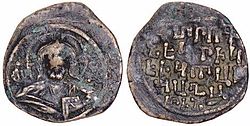You can help expand this article with text translated from the corresponding article in French. Click [show] for important translation instructions.
|
| Kiurike II Գուրգեն Բ | |
|---|---|
 | |
| Reign | Kingdom of Lori: 1048–1089 |
| Predecessor | David I Anhoghin |
| Successor | David II |
Kiurike II (alternatively spelled Gorige, Korike or Gurgen) was the third king of the Kingdom of Lori. He was succeeded by his son David II. [1]